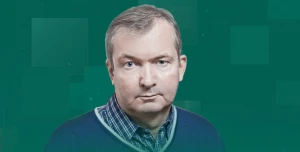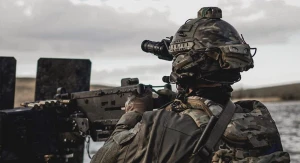
Ukraine, Russia face critical moment on frontline — Colonel Grant
Retired British Army Colonel, military expert Glen Grant tells Espreso TV about the critical situation at the front and the change in strategy by the Ukrainian Armed Forces' new leadership
How do you see the situation on the contact line? What should we expect from the Russian offensive?
The first thing is, it's a closely fought battle and both sides are pushing hard, possibly due to the elections in Russia.
General intelligence reports suggest that the Russian side, although appearing strong, is not as formidable as it may seem. However, they are fully committed to the battle, indicating limited reserves or additional support.
Furthermore, there are reports of extra ammunition from North Korea, in addition to their own production. This puts the Russian forces in a much stronger position compared to the Ukrainian troops, who have been forced to retreat and are now consolidating their defenses along the river lines west of Avdiivka.
It is hoped that these defensive lines have been adequately prepared to withstand the pressure. However, it is evident that the Ukrainian side is facing challenges due to a lack of personnel and ammunition, compounded by limitations in support from America and Europe.
The outcome of this battle could be decisive. If Ukraine manages to hold the river line, it will buy them time to stabilize the front and strategize for the future. However, if Russia breaks through, the coming months could prove to be extremely challenging.
How powerful is the enemy's offensive after Avdiivka? How do you see the Russian General Staff's plan?
The main Russian aim is to exhaust Ukraine and achieve a breakthrough, without a doubt. Putin perceives the West as being weak currently, providing him with a favorable opportunity to launch a strong attack. It's evident that if a side lacks sufficient ammunition and manpower, it becomes vulnerable to attacks as its weakness is exploited by the opposition.
On the Ukrainian side, we did not help ourselves by holding onto our positions for as long as we did, particularly in places like Avdiivka. This decision has cost us dearly in terms of resources that could have been better utilized in a more strategically prepared position along a straight line. Holding a pocket like Avdiivka requires significantly more soldiers compared to defending a straight line.
Russia will undoubtedly continue pushing and utilizing all available resources, especially with the upcoming elections in Moscow, where Putin needs to demonstrate success not just in one town but across the board to validate his entire battle plan.
Hence, this is a critical juncture for both Ukraine and Russia.
We can see that the front line is extremely active in the Kupyansk sector, Donetsk region and southern Ukraine. What direction can the enemy use or try to make a strategic offensive?
It's difficult to predict for two reasons. Firstly, it will depend on their success. Remember that the Russian Doctrine is to reinforce success. Therefore, their strategy will likely be to assess which of the areas they are pushing hardest shows the most vulnerability. They are not only attacking but also scouting for weaknesses. Whichever area appears weakest, they will reinforce it with additional ammunition and manpower to maintain pressure and potentially break through the defensive line.
Where can the enemy concentrate its resources, Kupyansk or the south of Ukraine?
Again, it's difficult to make a definitive assessment at this point.
While we have access to intelligence regarding Russian activities, it's important to recognize that the Ukrainian side ultimately determines the direction of the Russian attack. If the Ukrainian forces hold their ground, Russia may continue its current strategy. However, if any part of the Ukrainian defense begins to falter, such as the situation in Avdiivka, Russia is likely to focus its efforts there.
It's premature to speculate whether Russia will intensify its attacks in a specific area. There's significant pressure in multiple regions, including the south near Mariupol and the western front near Avdiivka. It may take another two weeks or so to assess how effectively the Ukrainian defense is holding in these areas before we can gauge where Russia will concentrate its efforts.
It's essential to acknowledge that predicting Russia's actions is challenging until they identify areas of success against Ukraine, which will guide their strategy.
If we talk about asymmetric actions on our part, what areas should we focus on?
Certainly, the primary target of strategic importance is the Kerch Bridge. Its destruction would disrupt transportation to Crimea, forcing Russia to rely on sea or overland routes, both of which pose logistical challenges. Additionally, any delays in damaging the railway bridges would further impede Russian movements.
While I acknowledge the value of asymmetric actions, I doubt their immediate effect on the frontline against Russia's formidable resources and capabilities. Our primary focus should remain on fortifying and defending the frontline. Effective asymmetric strategies often require advanced weaponry such as long-range missiles and increased sea drone capabilities, which we currently lack in sufficient quantity.
Asymmetric actions only truly exert power when directly linked to frontline operations. Merely targeting the rear may not yield the desired frontline impact unless executed with strategic ingenuity. An example from World War II illustrates the strategic value of disrupting key industrial targets like power plants and ball bearing factories, as they are essential for enemy machinery and mobility. Today, disrupting electronic chip production could similarly hinder enemy capabilities, but Russia's access to these components from abroad complicates this approach. Sanctions play a crucial role in limiting Russia's fighting capacity by targeting essential supplies like artillery ammunition.
Ultimately, frontline combat training and the mastery of essential artillery and drone capabilities remain irreplaceable components of our defense strategy. These fundamentals, combined with innovative approaches, are essential in confronting Russia's military might effectively.
Hundreds of Russian soldiers are killed every day, enemy aircraft are shot down, the enemy is regrouping, and changes are taking place in the Russian military districts. What can this mean? There is a feeling that a new stage of the Russian-Ukrainian war is coming. How would you characterize it?
On the Russian side, it's evident that they are rapidly learning, adapting, and evolving their battle strategies at a pace surpassing that of the Ukrainian general staff. Their effectiveness in implementing these changes is undeniable.
However, as I've emphasized before, Ukraine must find a way to outmaneuver the Russians strategically. Creating uncertainty and disrupting their rear positions has proven effective in causing them to retreat, as seen at Izium. Even well-trained troops have fled when faced with this situation, just got on the bicycles and ran away. When the Russians find themselves outflanked, they become vulnerable and are more likely to break.
The danger lies in engaging the Russians head-on in a conventional, Soviet-style battle. In such scenarios, Russia's numerical superiority, greater ammunition supply, and overall equipment advantage make them stronger than Ukraine. Therefore, it's imperative to reassess our approach to this conflict and consider alternative strategies.
Continuing to confront Russia using the same tactics they employ against us will only lead to further retreats on our part. It's essential to think innovatively and employ tactics that exploit Russia's vulnerabilities.
What about new military districts?
I don't believe there's a clear logic set behind things yet. We need time for study and to understand the implications of some of the Russian changes. It seems they are attempting to innovate and conduct the war at a new level, but their exact intentions are not yet clear.
What will the spring and summer campaign look like? Will the enemy dare to open additional frontline areas, particularly in Belarus?
It's uncertain.
Nobody fully understands the situation due to the various factors at play. General Syrskyi and his new team aim to change the approach to fighting, which is the first variable. If they succeed, it could lead to a shift in the dynamics of the conflict. However, without such changes, there is a risk of either a stalemate or further territorial losses for Ukraine.
The second variable is whether the Ukrainian defense system will establish a proper training system, as currently, there isn't one in place. Improved training could significantly enhance the quality of Ukrainian forces and their effectiveness in combat.
The third variable concerns the support from Europe and the US, particularly in terms of financial aid. If Congress allocates funds, Ukrainian troops will have access to more ammunition and resources, improving their ability to fight.
The fourth variable is Belarus. While it remains independent for now, I think I would say that, but there is an election coming this year and we don't know what will happen in Lukashenko's mind. I mean we know he'll be reelected because there's no election. Of course, it's just like Russia. It's just that he will become the president with probably with a hundred and forty seven percent of the vote or something ridiculous, but we don't know them whether he will play positively on the side of Putin having been reelected or whether Belarus will stay independent and there will not be any more threat from from the north.
You need to look at each of these variables and test them. And certainly as a society needs to be asking what changes are going to be made from the military because it's pointless changing all the commanders and putting new commanders in place. If there is no change after those commanders, if they just carry on doing the same, then we might not as well have changed them because there's no nothing different. So we will be looking to see and the West will be looking to see that there is a positive dynamic with new commanders towards a Western way of fighting and not continuation of the Soviet fighting and a Western way of training.
Recently, European leaders met in Paris, and the French president promised to increase military support. To what extent is it realistic for Ukraine to expect, for example, military assistance with personnel from our European friends?
Firstly, let's clarify that there's nothing particularly new about this situation. This is merely another step forward along the same trajectory. Macron's acknowledgment of the threat to Europe is more about political maneuvering to bolster his own image and influence within Europe, rather than genuine concern for Ukraine. Any supposed "new" actions or support from France could have been provided months ago, highlighting the political nature of his statements.
It's worth noting that French deliveries of support often fall short of expectations, and this tendency should temper any excitement over their promises. While some Northern European countries like Estonia, Finland, and Poland have taken tangible steps to address the situation, many other European nations fail to grasp the gravity of the threat they face without American support.
Macron's statements lack the necessary force and energy to indicate genuine commitment. If he were truly serious, we would see French troops deployed to Ukrainian soil promptly. However, his rhetoric suggests more talk than meaningful action. Serious countries prioritize action over talk, and Macron's approach seems to prioritize rhetoric over tangible efforts.
Regarding the United Nations, it's important to recognize its limited effectiveness and influence. It's just a talking shop. It has as much energy behind it as any of the supermarket chains in Europe. In other words, it's nothing. Similarly, the European Union has yet to fully grasp the urgency of the situation and take decisive action.
In summary, despite the rhetoric and discussions, there is little indication of substantial change or meaningful action. The absence of concrete steps, such as deploying troops to Ukraine, suggests that the current situation is more characterized by talk than genuine transformation.
- News













































